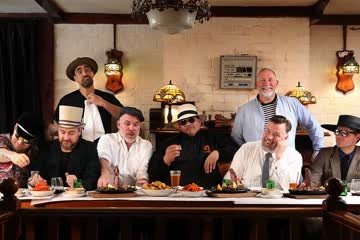Five Indie Games That Do It Better Than The Big Leagues
Not a sporting franchise to be seen in this list
Video games are arguably more like movies than ever, which is both a good and bad thing. On the plus side, the storytelling craft, cinematic scope, quality acting and narrative depth found in video games these days is generally on par with, and in some cases surpasses, that of the mainstream film world. On the other hand, just like the line-up at the local Dendy, a lot of gaming releases at the moment are parts of franchises, sequels, prequels, reboots or, uh, movies.

At last, my dreams of emulating Vin Diesel have been realised.
That's not to say there aren't genuinely breathtaking or otherwise worthwhile mainstream works out there, but there's a whole lot of awful, too. However, also like the movie industry, one segment of the video games market consistently pumps out titles that are affordable, often of very high quality and widely underrated: independent developers. So, in the spirit of supporting the little guy, here are some indie gems that might have slipped past your radar this year.
Don't miss a beat with our FREE daily newsletter
5. Amnesia: A Machine for Pigs (PC/Mac/Linux, $19.99)

If you're the sort of gamer that goes for an experience built on pants-shitting terror, this just-released first-person survival horror from Frictional Games may do the trick. Set in 1899, you are wealthy industrialist Oswald Mandus, who wakes with a fever, plagued by dreams of a horrible, hellish engine, visions of a failed expedition to Mexico, and the unshakeable sensation that something horrible has happened to his children.

“Well, they're not in the sacrifice-orium. Ahh, I'm sure they're fine.”
Where the shit are Mandus' children? What the hell is the devilish machine that haunts the back of his mind? Like last year's urban-legend minor sensation Slender (which easily would have made this list had it been released this year) Amnesia: A Machine for Pigs uses its environment to convey a pervasive sense of impending doom, driving you towards the mystery's answers if only because you're too petrified to stop and look behind you. It's an experience best enjoyed through headphones, in the dark. Wait, not enjoyed. Endured.
4. Sang-Froid: Tales of Werewolves (Windows, $14.99)

Lumberjacks! Werewolves! The motherfucking Devil! Artifice Studio proves strategy gaming is alive and well with its quirky take on the genre, casting players as one of the two feuding O'Carroll brothers, who must learn to work together to fend off waves of supernatural beasts and ultimately save their sister from the clutches of Satan himself.
By day, booby trap the balls off the forest so that, when night falls, you're better placed to fend off the lupine hordes hell-bent on your destruction. Give those that make it past your traps a face full of shotgun should they get too close.

Or a face full of exploding magic crossbow. Whatever's handy.
Somewhat surprisingly for a game about Canadian lumberjacks, brains are prioritised over brawn, Sang-Froid boasting an RPG-based skill system and a unique Fear Factor mechanic, which makes clever intimidation of your enemies a viable (and often preferable) alternative to blunt force. But that doesn't mean the hack-and-slasher in you can't engage in some serious fantasy action in which you're an exceedingly manly lumberjack and the forest is full of clones of the kid from Teen Wolf, and that potential is worth the price of entry alone.
3. Don't Starve (PC/Mac, $14.99)

With its kooky soundtrack and gothic art style, Klei Entertainment's Don't Starve is what might have happened if Tim Burton had created Minecraft. In the Canadian indie house's addictive little survival adventure game, you take the role of Wilson, a wild-haired Gentleman Scientist, plucked from his own world and deposited in a strange, unfamiliar land by a demon called Maxwell.

Thanks a bunch, Maxwell.
Once Wilson wakes up, it's up to the player to ensure his survival through gathering, hunting, strategising and learning all about the birds and the bees and the ways those animals might try to fucking kill you (hint: it's a lot). Don't Starve does possess an unlockable adventure/story mode, but is mostly a sandbox experience – repeat and refine your actions day-to-day to help streamline the survival process until you can become king of those goddamn animals. Then we'll see who kills whom in the night.
2. Badland (iOS, $3.99)

If there's one genre of game that just refuses to die, no matter how many improvements and variations are offered on the theme, it's the side-scrolling platformer. Good thing, too, because otherwise we might never have seen the gorgeous Badland, developed by two-man Finnish studio Frogmind.

Two. Two people made this.
The tale of a forest inhabitant on a quest to discover just what exactly is amiss in his wilderness home, Badland simply bleeds atmosphere, utilising the same silhouette aesthetic as found in Playdead's 2010 indie masterpiece Limbo, and sporting the physics-programming prowess of the controller-breaking Super Meat Boy. While there's not much to it below the surface – and that surface is mostly shadow anyway – the fluid controls and immersive backgrounds help in making Badland a perfectly valid and enjoyable alternative to spending time in an actual forest.
1. Gone Home (Windows/Mac/Linux, $19.99)

Players step into Kaitlin Greenbriar's shoes as she returns home in 1995 from a year away. She expects to find her family waiting for her but instead is welcomed by an empty house and a note from her sister, Sam, pleading with Kaitlin not to come looking for her. Being a game, of course, Kaitlin explicitly ignores the letter and goes searching for her wayward sibling.

She's probably inside the house.
What looks as though it could be dismissed as just another indie survival horror is actually an immersive, story-driven exploration experience that sets itself apart from the pack in more ways than one. The game's nostalgic setting whisks the player back to a time that predates social media and broadband internet, so there's a real feeling of disconnection from the wider world as Kaitlin pieces together what happened to her family, while its original soundtrack, drawing on the punk rock and riot grrrl movements and featuring music from acts such as Heavens to Betsy and Bratmobile, lends an air of authenticity and teenage angst that help propel the narrative towards its heart-wrenching conclusion.
It would have been so easy to make this game just another experiment in freezing players to their seats in terror, but instead developers The Fullbright Company have gone the opposite direction entirely and delivered an engrossing tale of love, loss, sexuality, and exploration - of both the environment and self – that makes Gone Home a truly special achievement.
So, yes, blow your hard-earned cash on your Saints Row IVs and Grand Theft Auto Vs, but don't forget there's a wide world of gaming excellence out there - and not a sporting franchise to be seen - for those willing to put in a little bit of effort to find it. It's well worth it.







